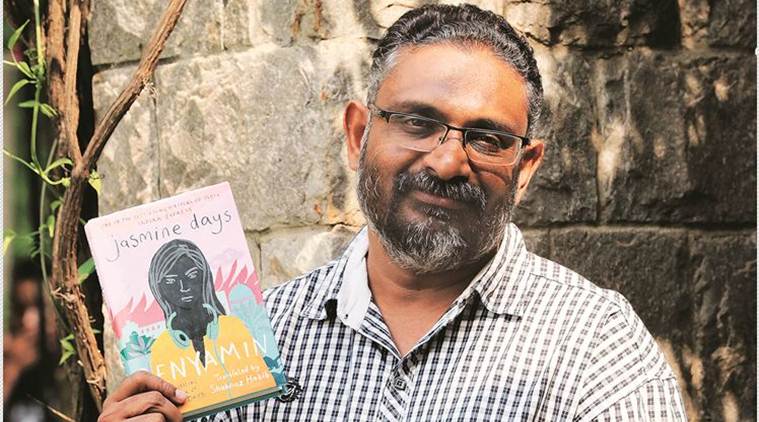Life in a Story
Malayalam author Benyamin on winning the inaugural JCB Prize for Literature for Jasmine Days and life in the Gulf.

Benyamin’s Jasmine Days is set against the backdrop of the Jasmine Revolution. (Express photo by Renuka Puri)
Malayalam novelist and short story writer Benyamin is best known for his 2008 critically-acclaimed novel Aadujeevitham, which was translated into English as Goat Days. Hailing from Kerala’s Kulanada village, he lived in Bahrain for over two decades. His novel Jasmine Days, which has been translated into English by Shahnaz Habib, won the inaugural JCB Prize for Literature, which was announced on Wednesday.
Jasmine Days tells the story of a Pakistani girl in the midst of a revolution in an unnamed country in the Middle East. What was the inspiration for this story?
As a writer, I want to focus on the perspective of other people. Whenever I’m writing, I choose people from other communities. I was in the Gulf for many years and have many friends from the Arab community, so I know of many stories from them. I wanted to write a story with the Jasmine Revolution in the backdrop (the Tunisian revolution that deposed President Zine El Abidine Ben Ali), discussing the religious conflict between Shias and Sunnis. A Pakistani girl was more suitable for the narrative.
You don’t name any place or country, you’ve left it for the readers to infer.
Un-naming is the best part of writing fiction. When we name something, we limit our imagination. When I gather so many incidences and stories from other parts of the world, not naming something gives me room for fictionalising.
You’ve written over 20 books, including short stories, novels and memoirs. What were your expectations when you first started writing?
I had no expectations, but I did have some stories from around the world, which have not been told in my language (Malayalam). My expectation was to tell these stories. I had never expected that I’ll become a writer. I did not read much nor did I study literature in college. After working in the Gulf, I thought I should write. My only expectation was that someone should read my books.
You’re a mechanical engineer and you come from a non-literary background. How did writing enter your world?
I was very young when I shifted to Bahrain. I would work for eight hours and had the rest 16 hours free, so I started reading. This continued for seven to eight years. I would also write letters to friends, so that’s when I connected with the process of writing. You won the Kerala Sahitya Akademi Award for Goat Days. Now you’ve won JCB Prize for Literature for Jasmine Days.
Have the awards changed anything?
Initially, I wrote for myself and my happiness. But when more people started reading my stories, the expectations rose. Awards are very interesting, as someone is recognising and accepting me. Earlier only critics used to inform people about the writers to look forward to and new books in the literary world. Awards give recognition.
Tell us a bit about Goat Days, which tells the story of a Malayali who migrates for the Gulf dream but ends up with a herd of goats in a desert in Saudi Arabia?
It was an expatriate’s experience, who I met accidentally. I thought I should tell that story because many of us think only about the glory of the Gulf countries but there is another side to that story too — it’s of the sufferings of many. There are happy stories, but there are sad stories too.
What is your next book about?
It’s already published in Malayalam. It’s set in the era between 1975 and 1995 in a village in Kerala. It was an important time in Indian and world history because of the Emergency, and the death of Indira Gandhi and Rajiv Gandhi. The story explores how that affected life in that village.










.png)











No hay comentarios:
Publicar un comentario